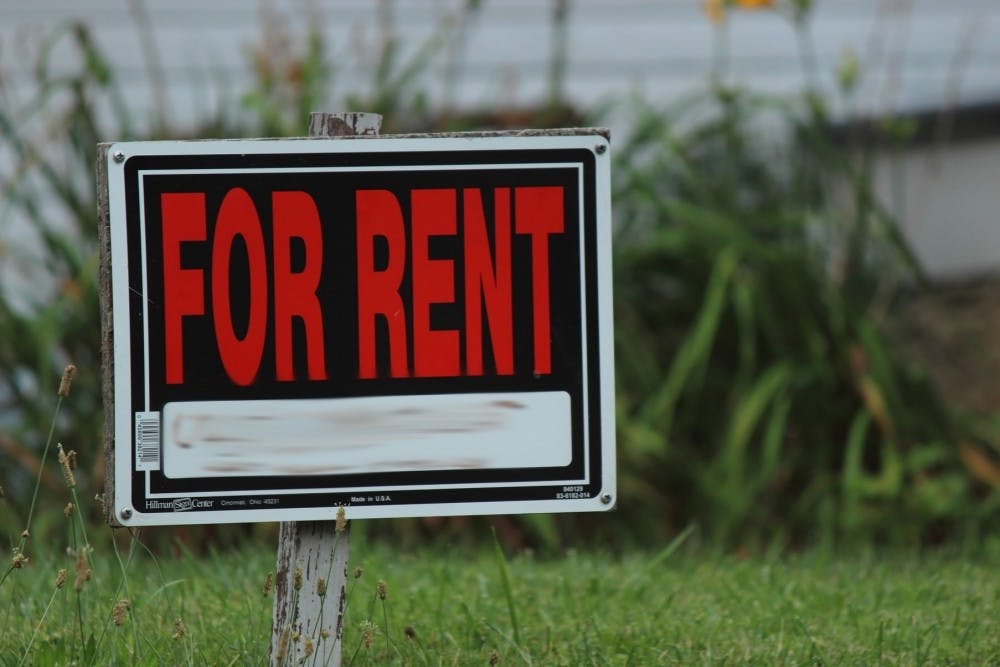For more information:
Guidelines for the leasers and landlords in the city of Muncie.
General breakdown of Indiana landlord and tenant laws
Indiana code title 32, article 31details landlord-tenant relations
John Connor’s office is L-17 in the L.A. Pittenger Student Center. Consultation is free to Ball State students.
With a new academic year underway, many students are living off-campus for the first time and may not know their rights and responsibilities as renters.
John Connor works as Ball State’s attorney for students and gives free legal advice on any topic to students .
“When they come in, it’s the first time, really, students have entered into contracts,” Connor said. “I think I can be of help to them in explaining what it is they are agreeing to, and I like to think when they leave here they have a different level of knowledge of what their rights and responsibilities are.”
In 2013, he saw 158 clients about renters' rights and responsibilities, second to criminal matters, which were about twice as common.
They will come in with questions about damages and roommate disputes, such as issues in paying rent or utility bills.
However, lease review is a subject he wishes he saw more. During a review, a potential leaser comes in with the contract and he explains to the leaser for what they are responsible.
One of the first things leasers are responsible for is getting their deposit.
Indiana code states that a landlord has 45 days to return the lease to the tenant following termination of the lease. Tenants must submit a written notice and a forwarding address.
“Without that, a landlord does not have to give a deposit back. … I would recommend you hand it in to them personally and have them initial it,” Connor said.
If damages are incurred during the lease or if rent goes unpaid, the deposit will be typically used to compensate for those costs, he said.
Connor’s recommendation to hand the notice in with initials goes into a deeper issue when leasing an apartment or house: objective evidence.
Whenever there is interaction between the landlord and tenant, or disagreements between roommates, Connor said to document it.
“It removes the he-said-she-said situation. If the landlord says the oven was filthy [on move-out] and you say it was clean, if you have a dated photograph on move-out day showing a spotless oven, that’s going to be pretty persuasive,” Connor said.
Photographing damage – especially on move-out – signed contracts and mailing dates are the way to go when protecting against landlord abuse or roommate conflicts, Connor said.
One way to minimize roommate friction is through a roommate agreement, especially with a joint-several lease, which means everyone is responsible for paying all the rent in one lump sum.
“I encourage students to do the roommate agreement because that way they have it in writing that they are responsible for their share of the rent," Connor said. "It’s an enforceable document; by having that document in place, you prevent a lot of problems from happening."
He said this should minimize problems from a roommate breaking his or her contract.
“If you break it you can be held responsible for all of your rent and any legal fees,” he said.
There is no grace period to break a lease after signing it, a common myth, along with the idea that leases are easy to break he said.
Still, breaking a lease is permissible under certain circumstances, such as beginning active military duty, being a victim of domestic violence or living in a unit that is unsafe and violates health or safety codes, according to Indiana law.
However, written notice must be given 30 days beforehand. This rule can vary depending on the situation.
If there is no legal justification for breaking a lease, depending on the landlord and lease, tenants may be allowed to find a sublease that would be responsible for paying the rest of the rent for the year.
A lease will detail how much the rent is, when and where it is due, acceptable payment types, late fees and bounced check fees and notice of increase in rent – typically 30 days unless specifically stated otherwise in the lease.
Landlords are not permitted to raise rent on long term leases until the lease ends and a new tenancy begins.
“If there is a problem, address it now; don’t wait till the end of the lease,” Connor said. "It frustrates me when people put up with issues with their landlord and wait to talk about it. There’s no reason a student should have to deal with that.”





